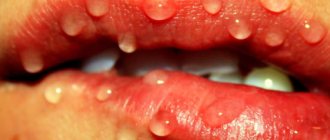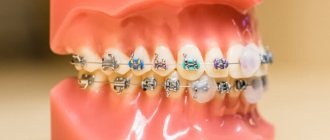Causes
Depending on the age of the child, the acetone odor can be observed in children for various reasons. In babies under one year old, the smell of pickled apples may be present due to improper functioning of the liver or pancreas. The baby has a specific aroma due to poor nutrition of the mother.
A child may develop acetonemic syndrome after an infection, severe stress, or banal overeating. Symptoms for this condition are:
- Pungent odor of acetone;
- Heat;
- Nausea and vomiting;
- Pain in the intestinal area;
- Weight loss.
Often a specific aroma is a sign of pathology or a pathological process in the child’s body. Diseases that provoke symptoms:
- ARVI, ENT diseases. Sometimes at the beginning of the disease an acetone smell is present. In addition to the stench, signs characteristic of sore throat are observed.
- Pathologies of the gastrointestinal tract that develop due to poor nutrition, consumption of fatty and spicy foods. The pancreas, which produces an insufficient amount of enzymes, causes acetone syndrome.
- Liver and kidney diseases. Impaired functioning of organs often leads to the appearance of acetone stench. A sign of the disease is pain in the right hypochondrium in a child.
- Disease of the endocrine system. In adults and children, the aroma of acetone may indicate thyroid disease.
In a teenager, the smell of acetone on the breath indicates acetonemia - an increased content of ketone bodies in the blood. In an adult, the acetone stench appears after drinking alcohol.
A slight acetone aroma may indicate the development of oral pathology. Low production of salivary secretion provokes the phenomenon. Diseases of the teeth and gums additionally cause unpleasant symptoms.
Poor nutrition
If the baby’s mouth begins to smell unpleasant, and diagnostic tests show that the patient’s health is fine, then the cause of the bad odor is poor nutrition. Frequent consumption of foods high in preservatives and dyes will certainly affect the child’s condition.
The menu for children should be different from that for adults.
Diabetes
In diabetes mellitus, the symptom of acetone stench is a common phenomenon, an indicative sign of the disease. Excess sugar in the bloodstream makes it impossible for substance molecules to penetrate cells. This leads to a dangerous condition - ketoacidosis. Symptoms:
- Strong acetone aroma from the child’s mouth;
- Dry mucous membranes;
- Abdominal pain;
- Vomit;
- Coma.
Symptoms of coma caused by diabetes include:
- Complete loss of consciousness;
- Strong aroma of acetone from the mouth;
- The temperature is normal or slightly elevated;
- Blood pressure is low.
If adults notice that the baby’s well-being is deteriorating, action must be taken. Such symptoms mean that the condition is close to critical. It is urgent to call an ambulance.
Intoxication
One of the reasons for the unpleasant smell of acetone in children and adults is poisoning. Eating low-quality, unprocessed foods and saturating the lungs with toxic fumes causes bad breath. Symptoms of poisoning include:
- Smell of acetone;
- Diarrhea;
- Continuous vomiting;
- Fever, increased temperature.
Pathologies of the liver and kidneys
The acetone aroma becomes a sign of disease in a number of internal organs. The liver and kidneys cleanse the body, removing harmful substances. When the disease occurs, the process slows down and toxic substances, including acetone, accumulate in the body. The smell of acetone is characteristic of cirrhosis, hepatitis and a number of other pathologies.
The smell of acetone from the mouth of a child: causes and treatment (Dr. Komarovsky)
Any changes in the baby’s health status worry caring parents. The smell of acetone from a child’s mouth may indicate the development of serious pathologies in his body. It does not act as an independent disease, but is always a symptom of dysfunction of any organs and systems.
The mechanism of acetone formation in the body
For the normal functioning of the body, energy is needed, which it draws from glucose. This substance has the ability to enter all cells of the body by transporting it through the circulatory system. Sometimes the process of glucose penetration into the cell may be disrupted, and the level of this substance will become insufficient.
Then the breakdown of lipid cells will begin. As a result, acetone is formed in the body. The body gets rid of excess of this substance by excreting it through the urinary (kidneys) and respiratory (lungs) systems.
In this case, a characteristic unpleasant odor of acetone appears from the mouth, and urine also acquires a specific aroma.
Why can a child's breath smell like acetone?
A specific bad breath, which is similar to the “aroma” of solvent or rotten apples, can appear in a child of any age - a teenager, a preschooler, a baby a few months old, and even a newborn.
Why is this happening? In most cases, this symptom appears in children aged 1-5 years, with girls suffering from it more often.
A child usually has acetone syndrome - primary (can appear in an almost healthy child against the background of a temporary health disorder) or secondary (a consequence of the course of the disease). This syndrome is accompanied by the following symptoms:
- itching,
- thirst,
- sleep disorders,
- weakness,
- increased fatigue,
- periodic occurrence of vomiting.
Digestive problems
If a child suffers from dysfunction of the digestive system, the process of protein breakdown in his body is accelerated, and dehydration may also occur. In addition to intestinal diseases of an infectious nature that occur in a chronic form, the following reasons can lead to the appearance of the smell of acetone:
- helminths,
- anorexia nervosa (common in teenagers),
- tumor or obstruction in the esophagus,
- diathesis,
- rotovirus,
- intestinal dysbiosis (accompanied by colic in the umbilical region, bloating and rumbling in the abdomen, and the passage of odorless gases).
ARVI and ENT diseases
Sometimes the breath smells of acetone shortly before the first symptoms of ARVI or pathology of the ENT organs appear, or during illness.
With such diseases, the child’s appetite decreases, and the speed of metabolic processes increases, as a result, proteins and fats are intensively broken down, and the amount of ketones in the blood increases. Typically, in addition to the unpleasant odor, fever, vomiting and diarrhea also occur.
If every disease of the ENT organs or ARVI in a child is accompanied by acetonemic syndrome, then it is recommended to pay attention to preventive measures:
- providing the body with sources of glucose,
- extended drinking regime.
Endocrine pathologies
If, along with the smell, there is lethargy or increased agitation combined with a sharp increase in body temperature, then there is a possibility that these are signs of thyroid dysfunction.
Food can provoke such disorders; factors such as nervous tension or stress cannot be excluded. Hypothyroidism is characterized by elevated levels of hormones in the blood, but this condition can be successfully normalized by taking medications.
Another cause may be diabetes.
Liver and kidney diseases
Removing harmful and toxic substances from the body and filtering the blood - these functions are performed by the kidneys and liver. If a child has developed chronic renal or liver failure (hepatitis, nephritis, cirrhosis), then an accumulation of harmful substances may occur in the body, including acetone.
In addition to standard symptoms, such conditions are characterized by yellowing of the skin (sometimes of the eye sclera), pain in the lumbar region or right hypochondrium, and enlarged liver.
When the case is advanced, not only the child’s breath can smell of acetone—urine and skin secretions also acquire a strong acetone “aroma.”
Oral diseases
A slight unpleasant odor sometimes means the development of oral pathologies. Often this unpleasant phenomenon is provoked by insufficient production of salivary secretion. If there are diseases of the teeth, gums or tonsils, the child’s breath will also smell. If you contact your dentist in a timely manner, he will prescribe adequate treatment and soon you can forget about the unpleasant symptom.
Diagnostic methods
At home, you can diagnose an increased amount of acetone in the body using special test strips. They allow you to determine ketone bodies in urine and are sold in a regular pharmacy. Some are based on color indication, sometimes you can find options with the designations + and -. The child’s condition is assessed visually:
- “+/-” - mild severity,
- “+” - mild condition, treatment at home is acceptable,
- “++” - moderate condition, it is recommended to visit a doctor or call a pediatrician at home,
- “+++” means that the condition is serious and the child needs to be hospitalized urgently.
At home, you can only diagnose the presence of ketone bodies. In order to find out the cause of the problem and choose an effective treatment strategy, you should contact a medical institution. Here you will need to submit not only urine, but also blood for laboratory analysis.
Treatment
Acetone has a toxic effect on the human body and is especially dangerous for children. If the level of this substance in the blood remains high for a long time, the consequences can be tragic. What to do to alleviate the child’s condition and prevent repeated acetonemic crises?
Treatment needs to be approached comprehensively. In addition to taking medications, it is recommended to follow a diet and pay attention to oral hygiene. At the first signs of acetone syndrome, you should provide the body with fluid and glucose (the ideal option is a sweet warm drink, 1 teaspoon every 5 minutes) and quickly remove ketone bodies. You cannot force a child to eat.
Use of medications
Under no circumstances should you prescribe medications to your child on your own.
The selection of medications can only be carried out by the attending physician based on a comprehensive diagnosis of the patient’s condition.
The drugs listed below are often used in the treatment of acetonemia, however, each of them has contraindications. Before taking any medications, you should carefully read the instructions:
- Nicotinamide. For the prevention of acetonemic attacks. Helps regulate glucose metabolism in the body.
- Enterosgel. To relieve intoxication, including in infants.
- Cerucal. From vomiting.
- Regidron. Restoration of water-salt balance.
- Smecta or Atoxil - absorbs toxins and removes them from the body.
- Stimol. Improved overall well-being.
- Betargin. Normalization of liver function.
- Creon. Improving digestion in case of pancreatic dysfunction.
Special diet
When acetone is elevated, it is recommended to reconsider your diet. It is important to minimize or eliminate the consumption of certain foods, for example, cauliflower, chips, sauces, mustard, sour cream, organ meats, legumes, carbonated drinks, as well as fatty, spicy, smoked and fried foods.
For 7 days after the onset of the syndrome, it is recommended to follow a strict diet: limit yourself to rice porridge, mashed potatoes and vegetable soups - everything is prepared in water. After a week, it is permissible to begin gradually introducing crackers and boiled/baked dietary meat. After another 10-14 days, you can eat fresh vegetables and herbs.
Hygiene
Bad breath can be a consequence of dental diseases. To get rid of a symptom, it is recommended to eliminate the root cause.
Attentive attention to hygiene will help eliminate the “aroma” and prevent the re-development of caries and other diseases of the oral cavity. It is recommended to brush your teeth at least 2 times a day, also paying attention to cleansing the surface of the tongue.
After each meal, you should use toothpicks and dental floss, and you should also not neglect special mouthwashes.
Dr. Komarovsky about acetone in a child’s body
According to the authoritative Ukrainian pediatrician Dr. E. Komarovsky, if parents discover that the smell of acetone is coming from their child’s mouth, there is no need to panic, but it is also impossible to ignore the symptom (we recommend reading: what does Komarovsky say about the smell from the child’s mouth?) .
Symptoms begin to appear from 2-3 years of age; in the period from 6 to 8 years of age, crises recur most often, but by the age of 13, acetonemia disappears if it is not caused by a systemic disease.
At the first appearance of vomiting, Komarovsky advises calling an ambulance, since it is not always possible to cope with this symptom on your own.
Acetone has a destructive effect on the child's body, especially on the brain.
Komarovsky recommends paying attention to the prevention of acetonemic crises - minimizing the consumption of animal fats, carbonated drinks, pickled vegetables, smoked meats, pickles, seasonings and salt.
Loading…
Source: https://spacream.ru/stomatologiya/chto-delat-esli-u-rebenka-pahnet-aczetonom-izo-rta-prichiny-i-lechenie-nepriyatnogo-zapaha-po-komarovskomu
Diagnostics
At the first stage, it is important to establish the true cause of the smell. It is necessary to contact a pediatrician so that the doctor examines the child and prescribes additional studies of biological material. The doctor will prescribe tests:
- Urine test for acetone;
- OAM, UAC;
- Test for blood glucose levels;
- Examination of stool to determine worm eggs;
- Blood test for biochemistry;
- Blood test for TSH.
If an endocrine pathology is suspected, an x-ray or ultrasound diagnosis is prescribed, in which the thyroid gland is examined.
Self-diagnosis
It is possible to determine the presence and content of acetone in urine at home. To carry out the procedure, you need to purchase special test strips at the pharmacy. Urine is collected in a container, the strip is lowered into the material according to the instructions. After the specified time, the color of the strip is compared with the indicator on the package. The rich color of the strip means that an excess of ketone bodies has accumulated in the body.
The child's breath smells like acetone Komarovsky
Bad breath from a child’s mouth is caused by various reasons. Sometimes a visit to a qualified dentist and compliance with good oral hygiene is enough to eliminate it. Unfortunately, these measures are not effective in all cases.
A particular health hazard is the smell of acetone from a child’s mouth. It indicates a malfunction in the body, which without proper treatment can lead to undesirable consequences.
Therefore, it is extremely important for parents to promptly consult a specialist to identify the cause of the disease.
What causes the appearance of acetone?
The main energy source for the body is glucose. When it enters the bloodstream, it is carried to every cell of the body. Due to its lack or inability to penetrate inside cells, the body has to look for new energy material, which is often fats or lipids.
Acetone bodies are formed during the breakdown of lipids and, once in the bloodstream, begin to be excreted by the kidneys and lungs. The result of a urine test for the presence of acetone bodies in such a situation will be positive, therefore, an unpleasant odor cannot be avoided.
Causes
The smell of acetone indicates improper metabolism. The increase in the level of acetone bodies is due to several reasons. To find out why a child’s breath smells of acetone, it is necessary to observe the state of the child’s body and focus on whether the unpleasant “aroma” is accompanied by other symptoms .
And yet, what provoked its appearance?
- Diabetes. Due to a lack of insulin, glucose is not burned and converted into energy, but accumulates in an undigested form in the blood. Brain cells that have not received the required amount of glucose signal the body to work under conditions of increased fatigue, resulting in an increase in the content of acetone bodies in the blood. In such a situation, the child is thirsty, experiences frequent urination, and scratches appear on the skin. The baby becomes capricious, lethargic, while he eats well, but loses weight.
- Thyroid. Its main purpose is the production of iodine-containing hormones. When the thyroid gland malfunctions, a large amount of them is released, which contributes to a faster breakdown of lipids. In addition to the smell of acetone from a child’s mouth, abdominal pain and Gospell’s disease (jaundice) indicate dysfunction of the endocrine system.
- Acetonemia. With a single appearance of an acetone odor, we can speak of an acetone crisis (neuro-arthritic diathesis); its systematic appearance already indicates the development of acetone syndrome (non-diabetic ketoacidosis). According to statistics, the disease occurs in 4-6% of children aged 1-13 years, with boys being more vulnerable.
- Impaired kidney and liver function. Both organs act as a natural filter. If their work is disrupted, harmful substances are not removed, but, on the contrary, begin to accumulate in the body, including acetone.
- Infectious diseases. When pathogenic microorganisms and viruses enter the child’s body, severe dehydration is observed. The prolonged course of the disease and poor appetite contribute to the appearance of an acetone odor.
Why can babies smell like acetone?
In breastfed infants, the appearance of an acetone odor is due to one of the following reasons:
- Mom's diet. Sometimes parents themselves are to blame for the bad breath of their child. Spicy and fatty foods, which mothers often eat, negatively affect the baby’s digestive system, which is why an unpleasant “aroma” often occurs. It is enough to change your diet, and the problem will disappear by itself.
- Hygiene. Young mothers do not always pay due attention to oral hygiene. When your baby's first tooth appears, you need to start cleaning it from unnecessary plaque. When your child smells of acetone only in the morning, there is no reason to worry. You just need to brush your teeth, preferably doing this in the morning and evening. At night, infants do not produce the required amount of saliva, which creates a favorable environment for the proliferation of bacteria.
- Nutrition. When introducing complementary foods into the baby's diet, parents start with cabbage, onions and meat purees. Consuming these products may cause an unpleasant odor. If metabolism in a small body occurs without any disturbances, the smell disappears after defecation.
- Fungus (thrush). If the appearance of an unpleasant odor is caused by a certain disease, for example, a fungus, you cannot do without the help of a specialist. A concomitant symptom of the disease is a white coating on the tongue.
- ENT diseases. An acetone smell may appear due to rhinitis. Due to clogged sinuses, the child has to breathe through his mouth, and this causes dryness and odor from the mouth.
- Stomach upset. In case of dysbacteriosis, the unpleasant odor disappears after a couple of days, but for this, the pediatrician must prescribe comprehensive treatment.
Diagnostics
If you detect a chronic odor of acetone from your mouth, you should immediately consult a specialist. The disease is diagnosed by taking tests. You can identify the problem yourself. To do this, you need to purchase test strips that determine the presence and level of acetone bodies in the urine.
With mild severity and the amount of acetone not exceeding 0.5 mmol per liter, the test shows “+/-”. There is no need for hospitalization. You can also leave your child at home if the test shows a “+”.
The test result showing “++” indicates a condition of moderate severity, the content of acetone bodies in the urine is about 4 mmol per liter. It is necessary to sound the alarm and urgently hospitalize the child if the test shows “+++”.
This is a distress signal: the child’s condition is extremely serious, the acetone level exceeds 10 moles per liter.
Diet with acetone
If there is an increased amount of acetone bodies in the body, foods with a large amount of preservatives should be excluded from the child’s diet. First of all, you should give up:
- drinks saturated with carbon dioxide;
- legumes;
- fried, fatty, spicy and smoked foods;
- chips;
- mustard and sour cream;
- cauliflower.
It is advisable to follow the diet for 2-3 weeks. The child's diet these days should consist of vegetable soups, mashed potatoes (without adding butter or milk) and cereals.
After 7 days from the start of the diet, the consumption of dietary meats and crackers is allowed. After 2 weeks, greens and fresh vegetables are allowed .
The main thing is to introduce new foods into the diet gradually to avoid overloading the body.
Advice from pediatrician of the highest category Evgeniy Komarovsky
Every parent should know that drinks whose temperature is close to the child’s body temperature are absorbed faster. To avoid repeated attacks, the baby needs to take the vitamin preparation Nicotinamide, which is involved in the regulation of glucose metabolism.
Children who have suffered an acetonemic crisis are recommended to spend as much time as possible in the fresh air and play sports. It is better to avoid excessive loads.
Parents should ensure that activities and walks in the fresh air begin after meals, and not on an empty stomach.
With the release of energy, new supplies of glucose will be required, and if the body does not receive it in the required quantity, the attacks may resume.
If you feel that your child’s breath smells like acetone, be sure to consult a specialist. It is impossible to independently determine the true causes of acetonemic syndrome.
Source: https://detki.shukshin-net.ru/u-rebenka-pahnet-izo-rta-acetonom-komarovskij/
Treatment
When the causes of the symptom are established, it is necessary to begin treatment. Therapy is not aimed at eliminating the symptom itself, but at eliminating the cause - treating the disease that caused the odor. It is important to provide the child’s body with glucose and remove ketones.
Glucose can be replenished by drinking sweet teas, compotes, and honey. Periodically you need to give your child still mineral water.
In a hospital setting, the child is given glucose drips. For pain and spasms, injections of antispasmodics are given. For vomiting, antiemetic drugs are prescribed.
At home, you need to give your child Atoxil. The drug eliminates toxins.
Rehydron - replenishes the water-salt balance. Smecta is a drug that gently coats the walls of the stomach, preventing toxins from entering the patient’s blood.
When the condition stabilizes, the drug Stimol is given. It normalizes metabolic processes in the body.
Normalizes liver functioning - Betargin.
Coma caused by diabetes requires immediate hospitalization. Activities are aimed at quickly reducing the content of ketone bodies and blood sugar.
Traditional methods
Home remedy therapy is aimed at getting rid of the symptom – bad breath. The disease that provoked the symptom should be treated by a doctor. Home Recipes:
- Chamomile tea will help remove the slight smell of acetone from your baby's mouth. It is necessary to use a teaspoon several times a day.
- The strong aroma of chemicals will help eliminate the mint infusion. The leaves of the plant are brewed and infused. During the day, you need to rinse your mouth with the infusion.
- A parent can prepare a delicious and healthy drink for their baby from cranberries or lingonberries. Fruit juice will improve the metabolic process in the body and eliminate odor.
- A decoction of sorrel masks the smell of the solvent. It is necessary to boil the raw materials for 20 minutes.
Folk remedies are attractive because they are natural, but are ineffective in treating severe pathologies. You should not focus exclusively on home treatment methods - you can waste precious time, and the patient’s condition will worsen.
Dr. Komarovsky about the smell of acetone from a child’s mouth. How to treat acetone in children (Komarovsky)
When the smell of acetone appears from the mouth or acetone is detected in the baby’s urine (it’s scary to think!), we are talking about acetone syndrome. This diagnosis is given to approximately 6-8% of children aged one to 13 years. People have long shortened the complex name of the problem to the phrase “acetone in children.”
The occurrence of the syndrome is due to the fact that the content of ketone bodies in the child’s blood significantly increases, which, in turn, are formed as a result of the breakdown of fat. During this complex process, acetone is released.
It is excreted in the urine, if there is even a slight deficiency of fluid in the body, it enters the blood, irritates the stomach and intestines, and has an aggressive effect on the brain.
This is how acetonemic vomiting occurs - a dangerous condition that requires immediate help.
The formation of acetone begins when the child's liver runs out of glycogen reserves. It is this substance that helps the body draw energy for life. If the load is heavy (stress, illness, active physical activity), energy is consumed faster and there may not be enough glucose. That’s when fats begin to break down, releasing the “culprit” – acetone.
This condition rarely occurs in adults because they have much richer glycogen reserves. Children with their still imperfect livers can only dream of such things. Hence the frequency of development of syndromes in childhood.
At risk are children with a thin build, suffering from neuroses and sleep disorders, fearful, and excessively active. According to doctors' observations, they develop speech earlier and have higher rates of mental and intellectual development compared to their peers.
Symptoms
You can suspect acetonemic syndrome in a child based on some characteristic signs:
- The child is lethargic and lethargic, the skin is pale, there are dark circles under the eyes.
- He has a poor appetite and is in no mood.
- The child complains of headaches that are in the nature of attacks.
We can talk about the onset of acetonemic vomiting when a child develops severe nausea and vomiting, which can quickly lead to fluid loss, salt imbalance, and in severe form - to the appearance of cramps, abdominal pain, concomitant diarrhea and in case of failure to provide timely assistance - death from dehydration.
The first “swallows” of the syndrome can be noticed when the child turns 2-3 years old, most often crises can recur at the age of 6-8 years, and by the age of 13, as a rule, all signs of the disease disappear completely, since the liver is already formed and the body is At this age, a sufficient supply of glucose accumulates.
The causes of exacerbations of acetone syndrome lie in many factors, including poor nutrition and family history. If the child had relatives in the family with metabolic disorders (diabetes mellitus, cholelithiasis, padagra), then the risk of the condition developing in the baby increases.
A doctor can make an accurate diagnosis based on laboratory tests of urine and blood.
Komarovsky about acetone in children
Acetonemic syndrome is not a disease, Komarovsky believes, but just an individual feature of the child’s metabolism. Parents should have a detailed understanding of exactly what processes occur in the child’s body. They were briefly described above.
The causes of the syndrome are a rather controversial issue, says the doctor. Among the main ones, he names diabetes mellitus, fasting, liver disease, disorders of the pancreas and adrenal glands, severe infectious diseases, and also, oddly enough, concussion and traumatic brain injury.
Release of Dr. Komarovsky’s program on the topic “Acetone in children”
Heredity alone is not enough here, the doctor is sure. Much depends on the child himself, on the ability of his kidneys to remove harmful substances, on the health of his liver, on the speed of metabolic processes, in particular on how quickly his fats can break down.
The doctor emphasizes that parents who detect the smell of acetone from their child’s mouth should not panic. However, it is impossible to leave it unattended; if necessary, mom and dad must be ready to provide first aid.
Diet
Diet is an important component of treatment. It is contraindicated to force a baby to eat against his wishes. On the first day, it is advisable not to feed the baby, just give him liquid at room temperature. When the growth of ketone bodies stops, offer your baby food. You need to eat often, in small portions. Particular attention should be paid to fluid intake. You should drink frequently, in small sips. Products allowed:
- Eggs;
- Fermented milk products;
- Porridge;
- Fresh and processed vegetables;
- Crackers.
Exclude from the children's menu:
- Sausages, sausages;
- Citrus;
- High fat dairy products;
- Fried spicy foods;
- Sparkling water.
The diet should be followed for at least two weeks. Products are introduced gradually, with caution.
Almost always, the smell of acetone indicates a pathology of organs or a pathological process in the baby’s body. The symptom may appear completely unexpectedly. It is important not to waste time and urgently consult a doctor. Only a doctor can identify the pathology in the child’s body and prescribe the correct treatment.
Site for women: relationships, beauty, fashion, children
Acetone is a substance that household chemicals cannot do without. It has excellent solvent properties with a pungent odor. Recently, young mothers have increasingly begun to turn to doctors with a single and unpleasant symptom - their child “smells” of acetone. It would seem like complete nonsense. Well, where can children get the smell of acetone? In fact, this could actually happen. Now let's try to understand the reasons for this phenomenon. The root of the problem is glucose reserves. The human body is designed in such a way that energy costs are replenished with glucose. On average, there is no more than 500-700 grams of it in the body per day. Under the influence of energy combustion, glucose breaks down into separate substances and ketones, which contain acetone. With normal physical activity and an appropriate supply of glucose, the breakdown of glucose occurs naturally, and acetone is excreted through the kidneys without any consequences. If a person expends more energy, the glucose supply is accordingly not enough and then the body takes energy from subcutaneous fat. Thus, a person can replenish his energy costs regardless of physical activity. This applies to an adult, but what about a child?
A child's glucose reserves are 100 times less than those of an adult and amount to approximately 50 grams per day. With proper nutrition and minor physical activity, this supply is more than enough for the normal development of the child. The fat reserve in children, especially under 5 years of age, is very small, so in case of glucose deficiency, the body has nowhere to take substances to replenish energy and then an increased concentration of ketone bodies with a characteristic odor of acetone may be observed in the urine. This often happens in children from 3 months to 5 years, especially if the child is small and very mobile. After 5 years, the child’s muscle mass increases significantly and subcutaneous fat accumulates.
Prevention of acetonemia in a child
Preventive measures include adequate sleep 8-10 hours a day and daily walks outside. If the problem is not predisposed by genetics, then it can be avoided by following simple rules.
Control the consumption of caviar, canned food, nuts, chocolate, butter, and strong meat broth. Overweight children should be strictly supervised by their parents. Arrange fasting days during the week. In addition, you need to supplement your child’s diet with balanced vitamins.
It is recommended to change your daily routine by introducing light physical activity and logic games. Minimize the consumption of animal fats and acidic foods, which subsequently form gases in the intestines.
In no case should parents self-medicate, even if they know how to stop an attack of acetonemia and reduce symptoms.
What is the danger of increased acetone?
Acetone syndrome is a condition in which the amount of ketone bodies in the blood increases. In this case, very specific symptoms are observed:
- nausea;
- vomit;
- specific odor from the mouth;
- acetone in urine;
- pallor and blueness of the skin;
- pain in the intestines;
- elevated temperature.
If you notice some of these signs together, do not delay visiting your doctor. The baby's condition can quickly deteriorate.
What is the main danger? Acetone poisons the baby's body, and the longer you, parents, remain inactive, the stronger the poisoning will be. If the correct treatment is prescribed in time, acetone will return to normal.
Doctor Komarovsky's opinion
Dr. Komarovsky does not consider the smell of acetone in children to be a disease. From his point of view, this is the specificity of metabolism that is worth taking into account. As a preventive measure, it is enough not to limit children’s sweets and ensure that they drink plenty of fluids.
Dr. Komarovsky knows exactly what to do if a child has acetone
If an acetonemic state appears before vomiting occurs, you need to start giving the child glucose, a teaspoon every five minutes.
Detection of bad breath in a child should not cause parents to panic, but it should mean that it is time to take certain actions.
Why does acetone rise?
Increased acetone, intestinal pain and other signs may indicate some serious diseases:
- Liver disorders. If your baby is chubby, pay attention to the functioning of the liver. With her disorders, similar symptoms are observed. The cause may also be an infectious disease that gives complications to this organ.
- Intestinal dysbiosis. Carbohydrates are very important for the life of children. If the intestinal microflora is disturbed, some of the carbohydrates are not absorbed, and the baby may experience carbohydrate starvation, while a specific odor is heard from the mouth, and the general condition worsens. If you, dear parents, suspect intestinal disorders in your baby, you should urgently start adjusting the nutrition system and visit a doctor who will advise how to fix the problem.
- Pancreatic disorders. This organ regulates the digestion of carbohydrates and blood sugar levels. If its work is disrupted, sugar levels rise and ulcers appear on the mucous membranes. In its most severe form, diabetes develops. I hope you have heard a lot about this terrible disease and do not want it to become the fate of your baby.
- Adrenal diseases. The work of these organs directly depends on the stressful situations that appear in the child’s life. When experiencing strong emotions, the adrenal glands block the absorption of carbohydrates.
Why does a child smell of acetone from his breath, what Komarovsky advises and how to treat it
The causes of bad breath in a child can be very different. Some require special treatment, others are completely innocent and go away without treatment.
First, you should pay attention to the causes of the smell of acetone and the features of its occurrence.
In any case, you should consult a doctor for diagnosis. Only a specialist can make a diagnosis and treatment.
Parents should know what reasons may precede bad breath:
- Diabetes.
- A diet that is overly restrictive.
- Constant dehydration of the body.
- Pathologies associated with diseases of the auditory, nasal passages and throat, with adenoids.
- Viral diseases, acute respiratory viral infections, influenza.
- Stomach problems if a small child has diarrhea or abdominal pain.
- Stress, general weakening of the body.
- Dental problems, oral infection, rotavirus are also important reasons.
- Genetic inheritance.
- Previous operations and injuries.
- Impaired functioning of the kidneys, liver, gall bladder.
It is worth paying attention to the unpleasant odor. If the smell appears in the morning, this indicates problems with nutrition and infections.
A periodically occurring odor indicates chronic diseases, and the odor appears during periods of exacerbation.
How to treat a child and get rid of the smell?
A specific odor cannot be cured unless the cause is identified. In this case, it is worth taking into account age-related characteristics, since hormonal changes in the body are no less important.
Note! The level of acetone in the blood can be determined at home using special probes.
This device is sold in pharmacies and is inexpensive.
You can remove the smell of acetone, sour smell and chemical aroma at home using simple treatment methods.
Treatment mainly consists of diet and preventive measures:
| Child's age | Why does bad smell occur? | How to deal with the problem, basic treatment |
| Infant | A newborn may smell acetone due to:
The unpleasant aroma in these cases appears only after sleep | For an infant, oral hygiene involves removing plaque that appears on the gums and teeth. A mother's diet while breastfeeding must be properly organized. During complementary feeding, problems may arise with an increase in acetone. In this case, it is worth consulting with an appropriate specialist. |
| 1 year | With a fever, a one-year-old baby may have problems with dehydration. This is what causes the increase in acetone | During illness, you need to drink a lot of fluids. If the smell appears, then with the use of a sufficient amount of tea, water, compote, the aroma will disappear |
| 2 years | Sometimes the smell of acetone appears due to the presence of helminths in the body. At the age of 2 years, children begin to actively explore the world, so infection easily enters the body through the hands | It is worth checking for the presence of helminths and consulting a doctor. Sometimes it is necessary to visit a gastroenterologist |
| 3 years and 4 years | During periods of exacerbation, you need to monitor the baby’s water balance and nutrition: set a clear meal schedule, eat healthy foods, exclude sweets, fatty and fried foods | |
| 8 years and 11 years | After the age of 10 years, many children are diagnosed with diabetes. You need to carefully monitor what food the aroma appears in. Stressful situations and physical injuries should also be taken into account | After consulting with your doctor, try changing your child’s diet, eliminating stressful situations, and monitoring the intake of microelements and calories. |
What is the acetone odor problem?
The appearance of acetone odor from the mouth cannot be eliminated using aerosols or toothpaste. Acetone breath often accompanies acute respiratory viral diseases or acts as their precursors.
In medical practice, this unpleasant phenomenon is designated by the Latin term – halitosis.
This is a characteristic sign of acetone syndrome; the smell of acetone from the mouth is usually accompanied by the same smell of urine, nausea and vomiting with fever.
Acetonemia is considered to be a serious disease, accompanied by a decrease in appetite against the background of intense metabolism. The result is an increase in the number of ketone bodies in the child’s blood, to which the child’s body reacts with the following symptoms:
- general malaise, lethargy, weakness of muscle structures;
- pale skin with the appearance of blue circles under the eyes;
- temperature jump, its highest value may exceed the safe level (38°C);
- paroxysmal pain in the intestines;
- gag reflex after eating;
- a specific smell - breath, as well as urine smells like acetone.
The accumulation of ketone compounds, causing signs of acetonemia, occurs due to incomplete breakdown of fats and proteins.
The lack of glucose, as the main source of energy for the growing body of children, leads to increased fat processing.
The process results in the release of toxic substances, including acetone, which is excreted by the kidneys and lungs. Therefore, breath and urine have an acetone odor.
Important: the appearance of signs of acetonemia is attributed to crisis situations that threaten cellular structures and the brain. Before contacting a doctor, you should exclude sweets and heavy protein foods from your diet, focusing on drinking plenty of fluids.
Possible causes of unpleasant odor
Acetone syndrome is generally considered to be the predominant cause of specific bad breath. The disorder is considered temporary for a practically healthy child, and the pathology is called primary. If bad breath in a child accompanies various diseases, the syndrome is called secondary, caused by certain disorders.
Poor nutrition
A child's body requires more carbohydrates than an adult. Lack of glucose leads to the need for increased digestion of proteins and fats, which leads to an excess of ketone bodies. Their increased level in the blood becomes a source of unpleasant odor.
In addition, the problem may arise in young children due to the first feeding. If the baby's stomach is not strong enough, the inclusion of fatty foods results in heaviness and pain in the stomach, accompanied by vomiting and diarrhea.
Problems with the endocrine system
The cause of acetone breath is often problems with the functioning of the thyroid gland. This leads to increased production of thyroid hormones, rapid breakdown of proteins and fats, accelerated metabolism with the appearance of characteristic symptoms:
- increased body temperature;
- state of lethargy;
- signs of increased excitability.
The smell of acetone can also warn of a poorly functioning pancreas, which is responsible for breaking down carbohydrates and maintaining normal blood sugar levels. By developing acetonemia, the organ sometimes responds to stressful situations, then the main symptoms of the pathology are complemented by the appearance of dry mouth.
Smell as a sign of diabetes
A frequently reported cause of halitosis with an admixture of acetone is diabetes mellitus, as a consequence of impaired carbohydrate metabolism. A lack of insulin does not allow the body to cope with the breakdown of glucose, and an increase in its level in the blood has a detrimental effect on the functioning of the brain.
The increased work of all body systems causes an increase in the number of ketone bodies that produce acetone. As a result, the baby is plagued by thirst and frequent urination with a good appetite, but with sudden weight loss. The child becomes lethargic and capricious, scratches the dry skin, and ulcers may appear on the mucous membrane.
Important: to clarify the diagnosis, the child needs an immediate consultation with an endocrinologist and a urine and blood sugar test. Diabetes mellitus is a dangerous disease that poses a threat not only to health, but also to life.
Disruption of the excretory organs
The kidneys and liver are unique filters that remove waste products and compounds of harmful substances from the human body. Due to disruption of the excretory system, complete filtration of blood does not occur.
Toxins accumulate in the body, including acetone. The child not only develops the smell of acetone from his breath, but this can become the onset of chronic diseases of the excretory system (nephritis, hepatitis, cirrhosis, etc.
), which develop at elevated temperatures.
Source: https://manexpert.club/ponos/pochemu-u-rebenka-poyavlyaetsya-zapah-atsetona-izo-rta-chto-sovetuet-komarovskij-i-kak-lechitsya.html
How to remove acetone if an attack occurs?
- be sure to feed your baby light carbohydrate foods, even if he refuses to eat;
- drink tea with sugar;
- if there is vomiting, give more fluids;
- Rinse your stomach with water.
There is no need to get carried away with medications, as they can provoke additional poisoning. You can give your baby No-shpa or activated carbon, but you don’t need to treat the child yourself. Be sure to tell your pediatrician about what happened.
He will prescribe therapy and monitor blood glucose levels. You don't want complications, do you? You can learn more about childhood diseases in the video course “Children's Health System from A to Z,” which I strongly recommend that young parents watch. This is a real overview of not only diseases, but also their prevention.
If you liked the article, recommend reading it to your friends and acquaintances. See you soon on the blog, dear friends!
Newborn regime - what should it be?
Hello, dear readers! Do you believe that a daily routine is the key to health, good mood and saved time for a person? I believe. Just recently I visited a friend who had a baby and was convinced that even babies need order and a schedule. But what kind of regimen should newborns have?
Healthy foods that are actually poisons
Hello dear readers. Today I was going to write an article on a completely different topic, but my plans changed. Grandmother came to visit us and brought all sorts of goodies for her grandchildren. The children's joy knew no bounds, because grandma brought such delicious red caviar and their favorite yogurt











